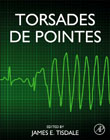
Over the past 25-30 years, deaths due to Torsades de Pointes (TdP) have resulted in numerous drugs being withdrawn from the market. However, nearly 200 drugs that may prolong the QT interval and cause TdP remain available. A number of drugs with the potential to cause TdP are among the top 200 most prescribed drugs in the US, whilst new information regarding TdP is emerging rapidly. The purpose of this book is to provide a comprehensive source of information on the topic of torsades de pointes (TdP), which is a life-threatening polymorphic ventricular tachyarrhythmia associated with QT interval prolongation on the electrocardiogram (ECG). Torsades de Pointes provides a detailed, up-to-date and emerging information related to the epidemiology, drug culprits, mechanisms, risk factors, and methods of prevention and management of the life-threatening polymorphic ventricular tachycardia, also known as torsades de pointes. The book contains current knowledge, incorporating recent and cutting-edge advances in understanding of topics including inherited channelopathies and congenital LQTS; drugs that cause QT interval prolongation and TdP; non-drug causes of acquired QT interval prolongation and TdP; epidemiology of inherited and acquired TdP; morbidity and mortality associated with TdP, particularly in association with specific antimicrobials, antidepressants and antipsychotics, and methadone; cellular and molecular mechanisms of TdP, traditional and emerging risk factors for TdP; methods of prevention and risk reduction for TdP; and clinical management of patients with TdP. This book is an essential reference for both clinicians and researchers - providing guidance for clinicians who care for patients receiving QT interval-prolonging drugs, as well as cutting edge information for scientists and investigators conducting research in the area. Up-to-date information on TdP associated with inherited channelopathies and the multiple forms of congenital LQTSIncludes a wealth of new information emerging regarding TdP, including newly-described risk factors and cellular and molecular mechanisms, contributions of genetic polymorphisms to drug-induced TdP, methods of quantification of risk, and methods of risk reduction, including clinical decision supportContains information on nearly 200 commonly used drugs that have the potential to cause torsades de pointes, including antimicrobials, antipsychotics, antidepressants, antiarrhythmic agents, methadone, and many othersAn essential reference for clinicians and researchers - provides guidance for clinicians who care for patients receiving QT interval-prolonging drugs, as well as cutting edge information for scientists and investigators conducting research in the area INDICE: 1. Overview of Torsades de Pointes 2. Electrocardiographic Biomarkers for Risk of Torsades de Pointes 3. Torsades de Pointes Associated with Inherited Channelopathies 4. Drug-Induced Torsades de Pointes 5. Mechanisms of Torsades de Pointes 6. Traditional Risk Factors for QT Interval Prolongation and Torsades de Pointes 7. Emerging Risk Factors for QT Interval Prolongation and Torsades de Pointes 8. Predictive Analytics for Reducing the Risk of QT Interval Prolongation and Torsades de Pointes 9. Antiarrhythmic Agents and Torsades de Pointes 10. Psychotropic Agents and Torsades de Pointes 11. Antimicrobial Agents and Torsades de Pointes 12. Methadone, Other Opioid Agents, and Torsades de Pointes 13. Anticancer Agents and Torsades de Pointes 14. Strategies for Prevention and Management of QT Interval Prolongation and Torsades de Pointes 15. Important Unanswered Research Questions Related to Torsades de Pointes
- ISBN: 978-0-12-821446-6
- Editorial: Academic Press
- Encuadernacion: Rústica
- Páginas: 310
- Fecha Publicación: 01/08/2021
- Nº Volúmenes: 1
- Idioma: Inglés
